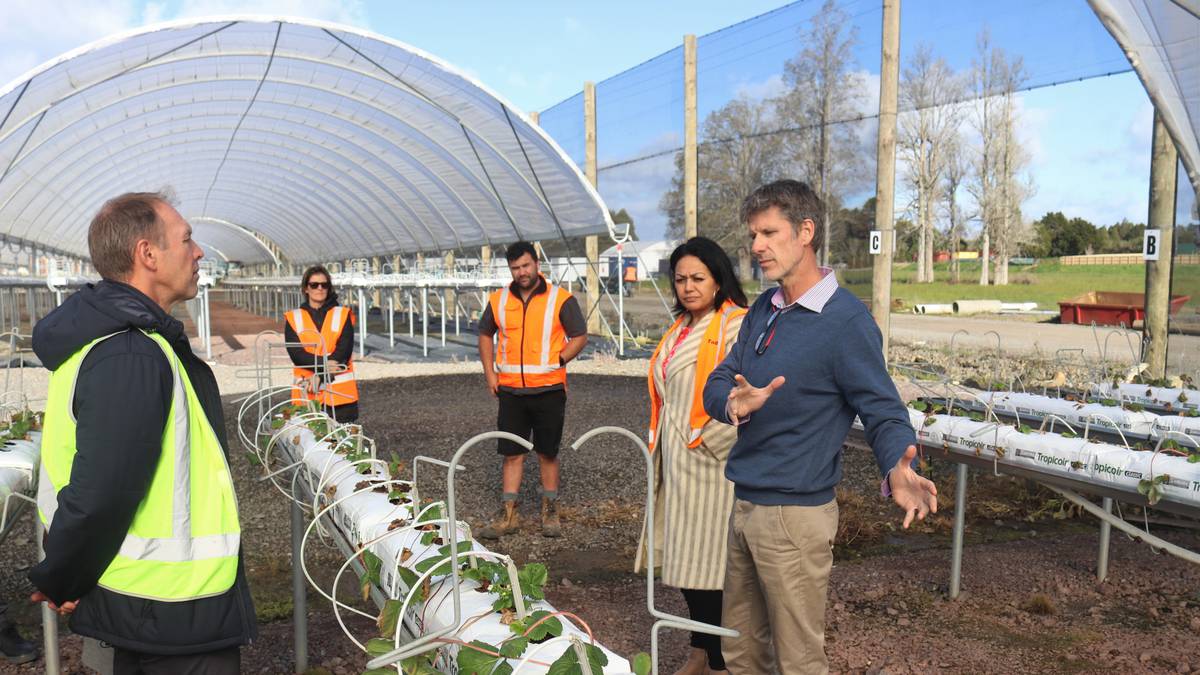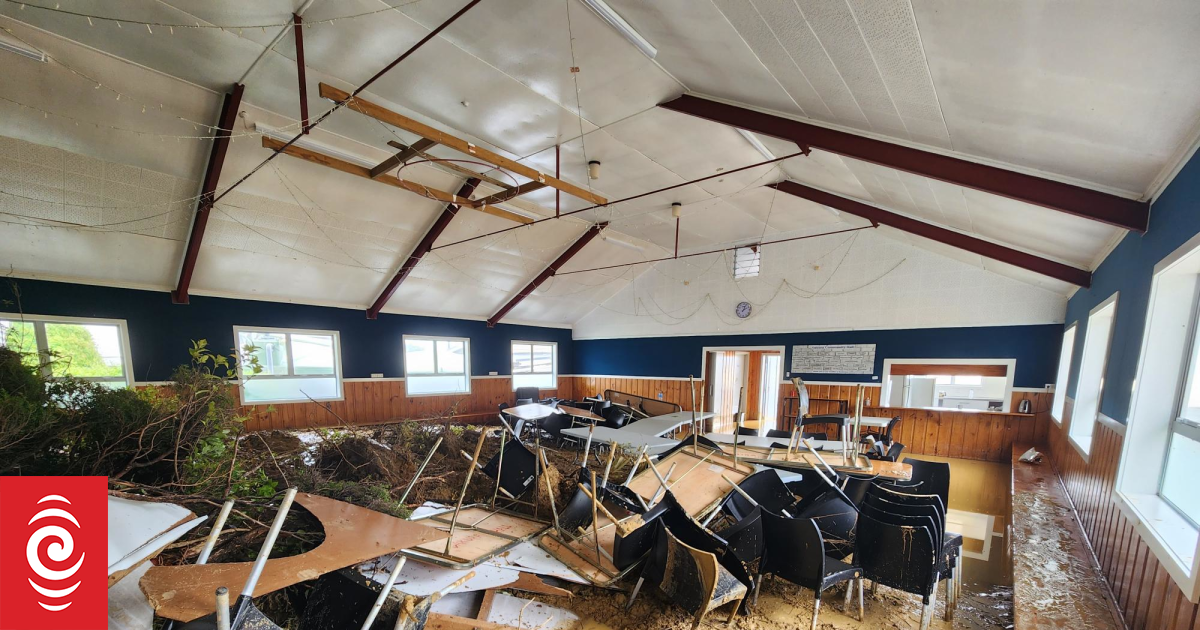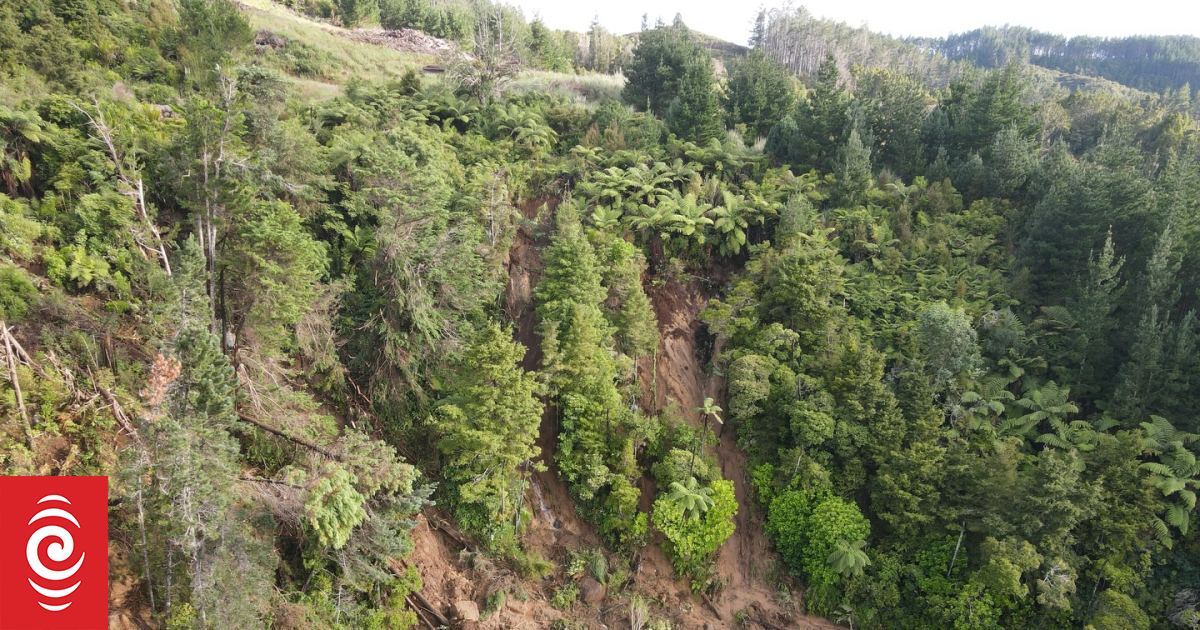Kaikohe Berries general manager Todd Jackson shows visitors around Ngāwhā’s strawberry-growing operation. Photo / Peter de Graaf
“Hugely transformational” and “a big vote of confidence in Kaikohe’s future” — those are just a few of the phrases used to describe a new business park launched in the Mid North this week.
Up to 300 people turned out before dawn on Tuesday to take part in the formal opening of stage one of the $48 million Ngāwhā Innovation and Enterprise Park, the biggest project to date by council-owned company Far North Holdings (FNH).
It’s envisaged the 240ha park, built on a former dairy farm just east of Kaikohe, will eventually create 500 jobs by luring new businesses with discounted power, abundant water, on-site training facilities, and a “closed-loop” system in which one company’s waste is another’s raw material.
So far an innovation hub with a laboratory, working spaces and meeting rooms has been built along with education facilities for Regent Training Centre and Te Pūkenga (the newly merged national polytechnic), where young people are already learning construction and automotive skills.
Advertisement
An iwi-owned strawberry farm, which will have 10ha of undercover plantings by spring, is the first business tenant.
It hasn’t all gone to plan, however, with avocado oil company Olivado — one of the original “anchor tenants” — dropping its plans to shift its production facilities from Kerikeri.
FNH chief executive Andy Nock said the aim was to transform the Far North from a low-value, low-skills supplier of raw materials to a producer of high-value ingredients and consumer products, by tapping into its climate, natural resources and young labour market.
Currently only one job was created for every 1000 tonnes of raw material that left the Far North, Nock said.
Advertisement
The figure for Hawke’s Bay was 7.5 jobs per 1000 tonnes while in Auckland it was 32.
/cloudfront-ap-southeast-2.images.arcpublishing.com/nzme/S5SKPRA27RAULDYR6AH7AMHB3Q.jpg)
“Pre-Covid we relied heavily on low-paid seasonal tourism and the export of raw materials … We need to add value and stop this exporting and adding nothing in the process. That’s what we’re trying to do here.”
The berry farm would create about 90 full-time jobs once all 10ha was planted, while Regent and Te Pūkenga could train about 200 students a year in skills such as joinery, welding and automotive work.
From the end of October inmates from the nearby Ngāwhā Prison would build fully-fitted-out transportable housing on site, giving them skills and helping ease the Far North’s housing crisis.
The innovation hub housed, among other things, a Northland Inc research and development facility and offices for all 30 FNH staff, who had moved from their former base in Ōpua.
Between the innovation park and social housing complex on Tawanui Rd, Kaikohe was where most of the company’s growth was happening.
“We’ve got to go where the work is. I think it’s a huge vote of confidence in Kaikohe’s future,” Nock said.
/cloudfront-ap-southeast-2.images.arcpublishing.com/nzme/FKKFOQ4ZGVCWPMAQF5INMBM7OE.jpg)
Ngāti Rangi kaumātua Albert Tana said the hapū had been closely involved in the project since the outset, and looked forward to improved training and work opportunities for youth.
“This is a big step towards a brighter future for our young people,” he said.
/cloudfront-ap-southeast-2.images.arcpublishing.com/nzme/HDLFE7GOIRE3JB6QU2DKZPF5UI.jpg)
Paul Knight, the chief executive of Ngapuhi Asset Holding Company, which co-owns the berry farm with FNH, said the iwi was trying to move away from its dependence on fisheries and encourage young people to stay in the Mid North by creating meaningful jobs.
Advertisement
The company also wanted to boost pride in the Mid North. It had deliberately branded its product as Kaikohe Berries so the public would associate the town with a premium food product.
The previous council got the ball rolling in 2018 by purchasing the farmland next to SH12 for $5 million.
The Provincial Growth Fund (PGF) granted $19.5m for key infrastructure while FNH borrowed a similar sum privately to fund the buildings.
Shane Jones, who was Regional Development Minister when the PGF funding was delivered, said the innovation park and the nearby Matawii water reservoir would transform the area.
“It was a privilege to have been the minister at that point in time … The innovation estate is akin to a sunshine park, given the recent bleakness over Kaikohe,” he said.
/cloudfront-ap-southeast-2.images.arcpublishing.com/nzme/THMB47IZF5BJ7E54OK4U67HRZY.jpg)
Mayor Moko Tepania called the project “hugely transformational” while former Mayor John Carter said it was one of the things he was most proud of from his time at the council.
Advertisement
Carter said Top Energy boss Russell Shaw deserved some of the kudos for coming up with the idea in the first place. It was taken on by the council when the power company couldn’t raise the money needed and on-sold the land.
Nock said stage two, which would include a shared food and beverage manufacturing facility plus brewing, fermentation and natural product clusters, would need further government funding.
Development of the park would continue for the next 5-10 years, he said.
/cloudfront-ap-southeast-2.images.arcpublishing.com/nzme/BSWVEZ3Z3NHUNBE6ALNAYF2FAE.jpg)
/cloudfront-ap-southeast-2.images.arcpublishing.com/nzme/FTWK7M55Q5C2NPJOP5P2UXQAAM.jpg)
/cloudfront-ap-southeast-2.images.arcpublishing.com/nzme/PXPDEHFT6JFWDGNHGI7ORSSRI4.jpg)
/cloudfront-ap-southeast-2.images.arcpublishing.com/nzme/ECXMSFXNL5CNPE4HI5GNWPEKEU.jpg)




